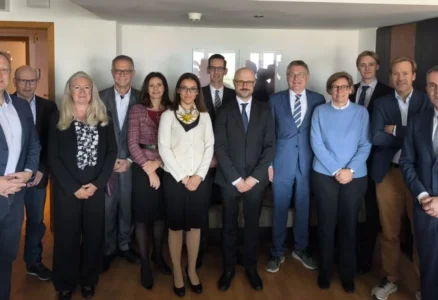The European Commission has today adopted a package of measures to improve the ability of companies to raise capital across the EU and ensure that Europeans get the best deals for their savings and investments. One year on from the 2020 Capital Markets Union Action Plan, the Commission is delivering on its commitments, proposing measures to boost European capital markets. This will help Europe’s economic recovery from the COVID-19 crisis, as well as the digital and green transitions. In addition, the Commission has put forward a Communication setting out the actions it will take next year to spur the market.
Today’s proposals will ensure that investors have better access to company and trading data. The measures will also encourage long-term investment and make it easier and safer for investment funds to be sold cross-border. Overall, today’s proposals will better connect EU companies with investors, improving companies’ access to funding, broadening investment opportunities for retail investors, and further integrating EU capital markets.
The legislative proposals adopted today are:
The European Single Access Point (ESAP): putting data at investors’ fingertips
The ESAP will offer a single access point for public financial and sustainability-related information information about EU companies and EU investment products. This will give companies more visibility towards investors, opening up more sources of financing. This is particularly important for small companies in small capital markets, as they will more easily be on the radar screen of EU, but also international investors. The ESAP will also contain sustainability-related information published by companies, which will support the objectives of the European Green Deal. As a common data space, the ESAP is a cornerstone of the EU’s Digital Strategy and the Digital Finance Strategy.
Review of the European Long-Term Investment Funds (ELTIFs) Regulation: encouraging long-term investment, including by retail investors
Today’s review will increase the attractiveness of ELTIFs for investors and their role as a complementary source of financing for EU companies. It will also make it easier for retail investors to invest in ELTIFs, in particular by removing the minimum €10,000 investment threshold, while ensuring strong investor protection. Since ELTIFs are designed to channel long-term investments, they are well placed to help finance the green and digital transitions.
Review of the Alternative Investment Fund Managers Directive (AIFMD)
Today’s changes will enhance the efficiency and integration of the Alternative Investment Funds market. The proposal harmonises the rules related to funds that give loans to companies. This will facilitate lending to the real economy, while better protecting investors and ensuring financial stability. The review also clarifies the rules on delegation. EU rules on delegation allow fund managers to source expertise from third countries. Today’s review will ensure that there is adequate information and coordination among EU supervisors, better protecting investors and financial stability.
Review of the Markets in Financial Instruments Regulation (MiFIR): enhancing transparency by introducing a “European consolidated tape” for easier access to trading data by all investors
Today’s adjustments to EU trading rules will ensure more transparency on capital markets. They will introduce a “European consolidated tape”, which will give investors access to near real-time trading data for stocks, bonds and derivatives across all trading venues in the EU. So far, this access has been limited to a handful of professional investors. Today’s review will also enhance the level playing field between stock exchanges and investment banks. In addition, it will promote the international competitiveness of EU trading venues by removing the open access rule.
Building on the actions announced in the 2020 Capital Markets Union (CMU) Action Plan, the Commission will follow up in 2022 with more CMU actions, including a proposal on listing, an open finance framework, an initiative on corporate insolvency and a financial literacy framework.
Members of the College said:
Valdis Dombrovskis, Executive Vice-President for an Economy that Works for People, said: “Europe needs vibrant and integrated capital markets to boost the real economy and bounce back after the COVID-19 crisis. Today’s proposals take us a significant step closer towards creating the Capital Markets Union. This is important for the growth of the EU economy. We achieve this by improving access to company and trading data, and gearing investments towards our sustainability and digital priorities. Today’s package has a strong focus on helping small companies in small capital markets, making it easier for SMEs to find and access different sources of funding. It will also enhance the international competitiveness of the EU as a place to trade.”
Mairead McGuinness, Commissioner responsible for financial services, financial stability and Capital Markets Union said, “Capital markets play an essential role, alongside banks, in financing our economy but more progress is needed to move towards the completion of the Capital Markets Union. We are today taking action at various levels: making our capital markets more transparent, facilitating access to financial and sustainability-related data, and making investment products such as ELTIFs and other alternative investment funds more attractive to investors and fund managers. This will better serve the needs of companies seeking finance to grow their business, which is crucial for the recovery and in meeting our green and digital objectives. But we are not stopping here; we are also announcing today more ambitious CMU initiatives to come in 2022 on access for companies to public markets, open finance, financial education and insolvency.”
Next steps
All elements of the legislative package will now be discussed by the European Parliament and the Council. Time is of essence and we invite the co-legislators to start work on these proposals as soon as possible.
Background
The goal of the Capital Markets Union (CMU) is to create a truly single market for capital across the EU. It aims to get investment and savings flowing across all Member States, benefitting citizens, investors and companies, no matter where in the European Union they are based. This is all the more urgent in light of the COVID-19 crisis and the financing needed to support the recovery, sustainable growth and the twin green and digital transitions.
Deepening the CMU is a complex task and there is no single measure that will complete it. Therefore, we need to make progress in all areas where barriers to the free movement of capital still exist. The four legislative proposals adopted today are an important step in the implementation of the Commission’s 2020 CMU Action Plan. They tackle problems across a broad range of capital market services and help achieve the core objectives of the CMU.



